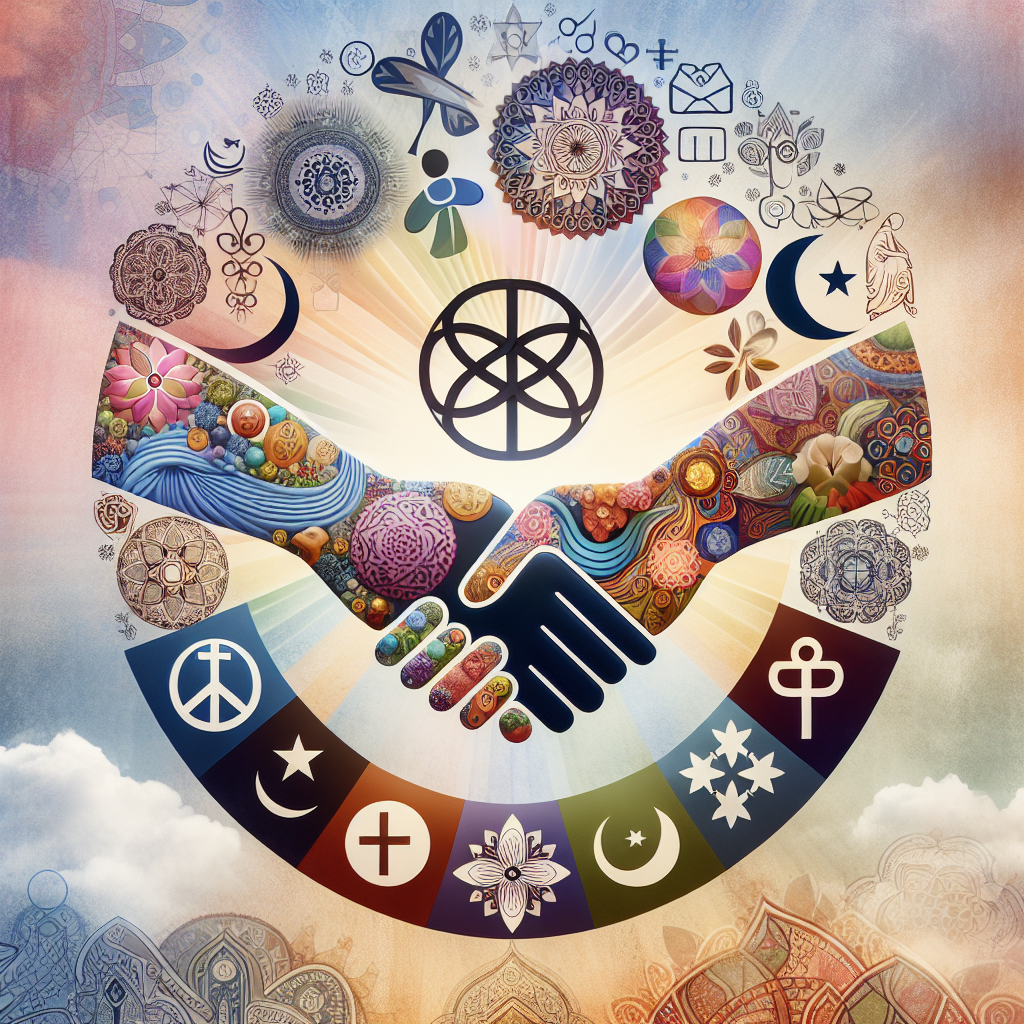“`html
Why Respect is Key to Interfaith Spiritual Unity
In a world that’s becoming increasingly interconnected, the importance of dialogue inter-religious has never been more crucial. Different faiths coexisting can lead not only to spiritual enrichment but also to a greater understanding of humanity itself. However, this potential can only be realized when there is a foundation of respect. Respect is not just a passive acknowledgment of others’ beliefs; it is an active commitment to understanding, learning, and sharing. This article delves into why respect is essential for achieving spiritual unity across various faith traditions, reinforcing the notion that all belief systems can contribute to a harmonious coexistence.
The Nature of Interfaith Dialogue
Interfaith dialogue is a structured communication process between individuals or groups of different religious backgrounds. It’s an opportunity to share perspectives, experiences, and beliefs in a safe environment. The essence of dialogue inter-religious is rooted in respect. When individuals participate with an open heart and mind, it lays the groundwork for mutual understanding. This not only helps to dispel stereotypes but encourages deeper connections among participants.
Respect in dialogue means listening more than speaking, acknowledging differences without judgment, and finding common ground. According to the Interfaith Council, when participants prioritize respect, they often discover shared values that unite them, leading to a more integrated spiritual experience.
Building Bridges Through Respect
Respect serves as the glue that binds diverse religious communities together. It’s easy to focus on the differences between faiths, but respect shifts the narrative to emphasize similarities. For instance, most religions share foundational morals such as compassion, honesty, and a pursuit of truth. By fostering a respectful atmosphere, these shared values can become a platform for collaboration.
Moreover, respect allows for humility. Individuals can admit their own limitations in understanding other faiths and be willing to learn. This humility can lead to profound discussions and potentially transformative spiritual experiences. According to a study published in the Journal of Religious Studies, participants in interfaith dialogues focused on mutual respect reported higher satisfaction and personal growth.
Respect and Emotional Intelligence
Emotional intelligence (EI) is crucial in navigating conversations surrounding spirituality. Respect is intrinsically linked to EI, as it requires empathy and self-awareness—two core components of emotional intelligence. Individuals who practice respect exhibit a greater understanding of their emotions and the emotions of others.
This emotional awareness is vital in interfaith dialogue. It allows individuals to engage in discussions sensitively and constructively. When participants express their beliefs passionately, respecting their feelings can lead to deeper dialogues and, ultimately, a more profound spiritual unity. By integrating EI into interfaith discussions, communities can create a more respectful environment conducive to true spiritual engagement.
The Importance of Active Listening
Active listening is one of the most impactful ways to demonstrate respect in any dialogue. It involves giving full attention to the speaker, understanding their message, and responding thoughtfully. In the context of dialogue inter-religious, active listening helps to break down barriers and form connections between disparate beliefs.
A checklist for effective active listening in interfaith dialogues can include:
- Maintain eye contact to show engagement.
- Avoid interrupting the speaker.
- Reflect back what you have heard to ensure understanding.
- Ask open-ended questions to encourage elaboration.
- Respectfully acknowledge differences of opinion.
By actively listening, participants can express genuine respect and foster a deeper sense of community, ultimately leading to a more unified spiritual experience.
Creating Inclusive Spaces
For dialogue inter-religious to flourish, creating an inclusive space is paramount. This includes being aware of cultural sensitivities and traditions. When respect is prioritized, individuals feel safe to express their beliefs without fear of judgment or ridicule. This sense of safety is essential for building trust among participants.
Inclusive spaces can be promoted through community workshops, interfaith events, or online forums that focus on shared learning experiences. The United Nations emphasizes the importance of respect in promoting interfaith harmony globally. Such initiatives provide platforms for diverse voices to be heard and celebrated, reinforcing the principle that respect is foundational for spiritual unity.
Respect as a Catalyst for Change
Respect has the power to catalyze significant change within and beyond religious communities. When individuals respect one another’s beliefs, it not only enhances personal relationships but can also lead to community-driven initiatives that address larger social issues. For example, many interfaith groups collaborate on projects that tackle poverty, promote education, or support humanitarian efforts.
The National Council of Churches highlights various interfaith initiatives that have successfully united different faith groups toward common goals, demonstrating the transformative potential of respect in action.
The Role of Education in Fostering Respect
Education plays a critical role in cultivating respect among different religious traditions. By incorporating interfaith studies into educational systems, individuals can learn about diverse belief systems from a young age, fostering a culture of respect. Programs that focus on interfaith education not only enhance understanding but challenge stereotypes that can lead to conflict.
In addition, educational institutions can encourage students to engage in community service projects with diverse groups, promoting the idea that respect is essential for genuine human connection. As future leaders are trained to embrace respect, they can continue to foster spiritual unity in their communities.
Toward a Future of Spiritual Unity
As we move forward in an increasingly diverse world, the importance of respect in achieving spiritual unity cannot be overstated. The journey toward understanding and friendship across different religions starts with open dialogue inter-religious rooted in respect. By cultivating understanding through active listening, education, and the creation of inclusive spaces, we can pave the way for a future enriched by various belief systems.
To consider the implications of respect in spiritual unity, a table outlining benefits and actionable steps can be incredibly useful:
| Benefit | Actionable Step |
|---|---|
| Enhanced Understanding | Engage in regular interfaith dialogues |
| Stronger Community Bonds | Participate in group service projects |
| Reduction in Prejudice | Educate oneself and others about different faiths |
| Increased Collaboration | Join local interfaith organizations |
Frequently Asked Questions
What is interfaith dialogue?
Interfaith dialogue refers to structured conversations between individuals from different religious backgrounds aimed at promoting understanding, respect, and cooperation.
Why is respect important in interfaith dialogue?
Respect allows participants to feel valued and safe during discussions, fostering an environment conducive to honest and open communication.
How can I promote respect in my community?
Engage in community service projects, attend interfaith events, and educate yourself and others about different religions.
What role does education play in fostering interfaith respect?
Education raises awareness of various beliefs and cultivates an environment of respect and understanding among individuals from different backgrounds.
Can respect lead to tangible social change?
Yes, when communities respect one another’s beliefs, they can work together to address broader social issues, creating impactful change.
How can emotional intelligence enhance interfaith dialogue?
Emotional intelligence enables individuals to understand their emotions and those of others better, allowing for more respectful and empathetic interactions.
What are some practical methods for practicing respect during interfaith dialogues?
Engage in active listening, acknowledge different viewpoints, and ask open-ended questions to deepen understanding.
As we reflect on the profound implications of respect within interfaith spirituality, let us embrace the lessons learned and take practical steps towards fostering unity. The journey begins with each individual, and the ripple effect can lead to a deeper, more meaningful coexistence in our diverse world.
“`

